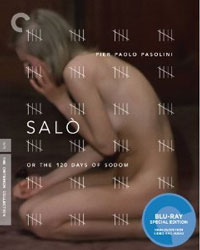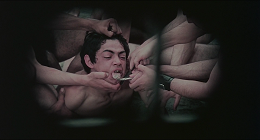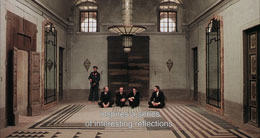When director Pier Paolo Pasolini‘s 1975 film Salò, or the 120 Days of Sodom was first shown to audiences, Pasolini was already dead.
 He was murdered months before by a 17-year-old street hustler, who later said he was under threat of violence to his family when he ran the director over with his own car three times. Many still believe it was Pasolini’s political views and the content of Salò that got him killed.
He was murdered months before by a 17-year-old street hustler, who later said he was under threat of violence to his family when he ran the director over with his own car three times. Many still believe it was Pasolini’s political views and the content of Salò that got him killed.
The Criterion Collection has just released the notorious movie, banned in several countries, on a Blu-ray filled with illuminating interviews, documentaries, and essays that shed some light on what these days might be considered a fairly impenetrable film.
Let’s just say this: Taken on its own, with no perspective of Pasolini, the time period in which it was filmed, or the specific allegorical context that the director intended, Salò, or the 120 Days of Sodom is quite easily one of the most shocking movies I’ve seen. Now that just isn’t because of the content that some considered pornographic (‘torture porn’ movies have an equal amount of offensive content and more often than not, no actual point), but also the dispassionate way in which these unnerving scenes are presented, and the twisted, sometimes campy tenor of much of the sadism shown onscreen.
 Without context, Salò, or the 120 Days of Sodom remains a frightful and fascinating examination of power run rampant and the unusual ease at which the victims become complicit. It is certainly an angry, charged work of art, no matter how degrading the acts in the movie may be.
Without context, Salò, or the 120 Days of Sodom remains a frightful and fascinating examination of power run rampant and the unusual ease at which the victims become complicit. It is certainly an angry, charged work of art, no matter how degrading the acts in the movie may be.
Partially inspired by Dante’s The Divine Comedy and its circles of Hell and purgatory, Pasolini transposes the Marquis de Sade‘s 1785 novel 120 Days of Sodom to the Republic of Salò, during the last days and 1944 fall of Mussolini’s Fascist Italy. The four wealthy, power-hungry sadists in charge of Salò round up a group of attractive young people and feed their basest animalistic desires for four months.
The sight of people urinating on others is enough to make one uncomfortable, but Pasolini pushes this feeling even harder by giving us no one to identify with. The four power-hungry sadists and their wives are viewed at the same distance as the 18 teenage victims. There’s no narration, no main character, no close-ups — in short, no point of view. Many of the shots — staged in both opulent rooms and decrepit sleeping quarters — are beautifully framed and symmetric.
 What’s worse: There is no hope in Salò, or the 120 Days of Sodom. The movie was a deeply personal film for Pasolini, who believed that the shallow consumerist culture of Italy in 1975 was abhorrent and the end of everything he held dear was at hand. The traditional Italian way of life, a society he knew and loved, was disappearing, and being replaced by “what Marx called a genocide of vital and real earlier cultures.”
What’s worse: There is no hope in Salò, or the 120 Days of Sodom. The movie was a deeply personal film for Pasolini, who believed that the shallow consumerist culture of Italy in 1975 was abhorrent and the end of everything he held dear was at hand. The traditional Italian way of life, a society he knew and loved, was disappearing, and being replaced by “what Marx called a genocide of vital and real earlier cultures.”
The result is Hell on Earth, a place where these values are being forced upon culture like a person being forced to eat shit. This, of course, literally happens in Salò, as it does in Sade’s work. There is something quite different about seeing its portrayal and just reading about it.
The film is a pissed-off reaction to the end of the idealism of the 1960s. When conformity sets in, Pasolini views the children of the 1970s as victims of an economic power that forces consumerist values on its people. In interviews on the Blu-ray, the discontent director says “power reduces the human body to a commodity” and that it “is dictated by its economic needs that elude common logic.” Ever the fatalist, he also states, “it’s a valid reality for all times.”
 By transposing his film to 1944, Pasolini was comparing the current ruling power in 1975 Italy to Hitler and Mussolini. The entire movie is a ruthless, shocking metaphor for a hollow culture that he viewed the same way people view Fascism. (I wonder what he would think of Italian culture today — Berlusconi has come closer to resembling the sexual sadists in Salò than I think anyone would care to admit. )
By transposing his film to 1944, Pasolini was comparing the current ruling power in 1975 Italy to Hitler and Mussolini. The entire movie is a ruthless, shocking metaphor for a hollow culture that he viewed the same way people view Fascism. (I wonder what he would think of Italian culture today — Berlusconi has come closer to resembling the sexual sadists in Salò than I think anyone would care to admit. )
Let’s return to the man’s overriding theme:
“Hope is a horrible thing invented by political parties to keep their members in line.” – Pier Paolo Pasolini
Wicked, disturbing, and sometimes darkly funny, Salò, or the 120 Days of Sodom can’t help but devolve into a depressing farce. Even at its sickest level, there is plenty of camp in the dialogue and performances of the libertines who force this degrading behavior upon their subjects.
Towards the end, it gets worse. Pasolini illustrates his belief that society forces people to conform by making his victims turn on each other and then makes the audience complicit. Just by watching the film to its sick conclusion, we are voyeurs, but Pasolini the angry provocateur calls us out in the most obvious way in the movie’s final moments.
Salò, or the 120 Days of Sodom is one of the most antagonistic films I’ve ever seen, and one I’ll not soon forget.








{ 1 comment }
This movie is poop, just poop. Dildos for miles!!!
Comments on this entry are closed.